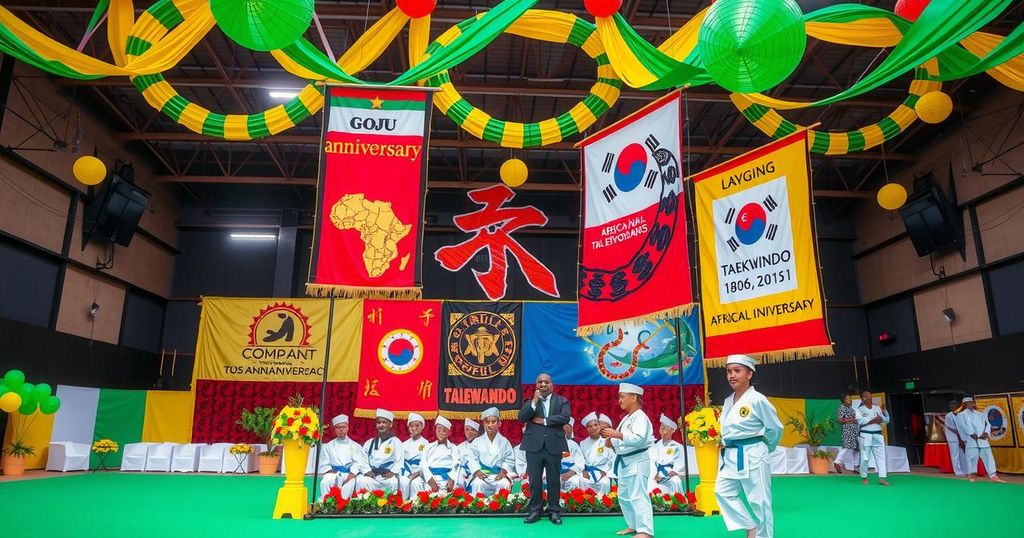Martial Arts Milestones Celebrated as African GOJU Marks 40 Years and Taekwondo Turns 50 in Ghana

Ghana celebrated the 40th anniversary of African GOJU and the 50th anniversary of taekwondo at an event in Accra. Danny Gwira, founder of African GOJU, emphasized the importance of indigenous martial arts for youth discipline and cultural preservation. Hanny Zahabi, the pioneer of taekwondo in Ghana, received a black belt at the ceremony. Demonstrations by young practitioners showcased the growing popularity of martial arts among Ghanaian youth. The event called for continued support and institutionalization of these disciplines.
Last Sunday was a significant day for martial arts in Ghana, featuring a dual celebration for two momentous anniversaries: African GOJU turned 40 years old, while taekwondo celebrated its 50th anniversary. The festivities took place at Beda’s Hotel and Events Centre in Ashongman, Accra, bringing together a crowd of martial arts veterans, enthusiasts, and community leaders—all eager to pay tribute to the rich legacies and relevance of these practices in Ghanaian culture.
Danny Gwira, the founder of African GOJU, was the main speaker at the event. He emphasized the importance of indigenous martial arts, not merely for self-defense purposes but as crucial tools for instilling discipline among youth and preserving cultural heritage. “African GOJU is a unique system of martial arts involving 50 defensive techniques tailored to a typical African setting. It teaches you to endure, react, and be street-smart,” he explained in an interview with Graphic Sports.
Gwira articulated a broader vision, noting that the influence of African GOJU transcends physical training. His remarks underscored the discipline’s commitment to promoting environmental consciousness and safeguarding community well-being. Describing African GOJU as a lifestyle grounded in African values, he stressed its role in empowering citizens to confront societal challenges.
The event also recognized pioneering figures in Ghana’s martial arts scene, most notably Hanny Zahabi, who introduced taekwondo to the country half a century ago. The African GOJU community honored Zahabi with a black belt, a gesture celebrating his significant contributions to the sport. Reflecting on taekwondo’s journey in Ghana, he remarked, “The sport has come a long way and is now a national pastime in many communities.” He called on current and future martial arts practitioners to embrace the core principles of discipline, self-defense, and resilience.
A highlight of the ceremony was a demonstration featuring over 20 young practitioners, ages 6 to 15, showcasing African GOJU techniques. Their performance captivated the audience and illustrated the growing enthusiasm for indigenous martial arts among Ghana’s youth. Each young participant was awarded a certificate of dedication, symbolizing their promise to uphold the legacy of the discipline.
The event saw the attendance of notable figures, including Ambassador George Haldane-Lutterodt, a former president of the Ghana Athletics Association and a supporter of African GOJU, who chaired the ceremony. In his remarks, he praised Gwira for his ongoing efforts to keep the discipline relevant and urged stakeholders to commit to its sustainable future. “Let us ensure African GOJU stands the test of time,” he said, also acknowledging the contributions of the honorees.
Veteran martial artists like Donald Gwira and George Heward-Mills were present, further enhancing the day’s significance. Their involvement emphasized that the event was not just about celebrating the past but also about motivating the next generation of martial artists in Ghana.
This dual celebration showcased the transformative power of martial arts within Ghanaian communities. African GOJU, with its essential ties to indigenous philosophy, alongside taekwondo, which enjoys global recognition, have transcended the realm of mere sports. They serve as vital instruments for nation-building and community empowerment. As Gwira’s vision of enhancing youth capacity and preserving cultural integrity resonated throughout the day, it revitalized calls for institutional support for martial arts in schools and local communities.
The anniversaries of African GOJU and taekwondo represent significant milestones in Ghana’s martial arts community. With a strong emphasis on youth empowerment, cultural preservation, and community well-being, these disciplines are more than just physical practices—they contribute to nation-building. Stakeholders are now called to action to support and institutionalize these martial arts across educational and community platforms to ensure their enduring legacy in Ghana.
Original Source: www.graphic.com.gh







